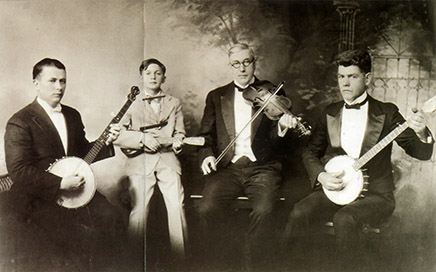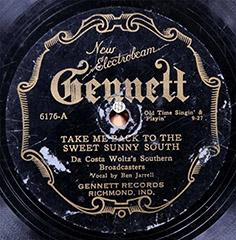CONTINUED FROM THE PRINT EDITION:
'King of Moonshiners' was an old-time music legend
Already halfway out of debt, Ben scheduled one last hurrah in Oregon — an extended visit on which he hoped to make $5,000. That would retire his debt completely and leave him with a little something left over with which to get into a less hazardous line of work back home. Unfortunately, Ben’s reputation had started to spread in Oregon, due to the quality of his product. Also, law enforcement officers had started figuring out how to sniff out a big liquor operation, and they had started watching the stores for bulk purchases of stuff like sugar, yeast, dried fruits, and corn. So when one of Ben’s helpers rolled into Walla Walla and bought a truckload of cornmeal, the transaction was noticed; and when the helper returned with the goods, he also brought a new customer with him. The customer sampled the product, pronounced himself delighted with it, bought a gallon or two, and headed off … to the law enforcement agency that he worked for. And a few days later Umatilla County Sheriff Tillman “Til” Taylor arrived on the scene at the head of a 14-man posse to shut the show down. They pounced upon it late at night, after Ben had gone to sleep, and caught all three of the moonshiners by surprise. The moonshiners were marched back to where the posse members had parked their automobiles earlier in the night. Of course, it was pitch dark, and they were deep in the woods; so they made camp by the cars for the night, planning to head back to civilization after daybreak. “They made a little campfire near the autos,” Ben told Lockley, “and as we sat around the fire we all took a few drinks from the keg they had brought along as evidence. I think all drank but Til. He wasn’t thirsty, he said. As they were all talking about what good luck they had in nabbing us I made a sudden dive like a cottontail into a bunch of small pines. There was a hummock about 40 to 50 feet from the fire. I dropped at full length behind that.” Ben stayed there for the rest of the night, figuring that if he tried to run for it, they’d catch him for sure. So he stayed put while the posse scampered around trying to pick up his trail. Finally they all came back to the campfire and sat around glumly talking about how fast he must have run to get away from them like that. “No use cussing about him,” Til said. “It was our own fault. I don’t blame him any, I would have done the same thing.” Ben, of course, hit the road as soon as he safely could. He’d made it across the state line into Idaho before Sheriff Til traced him; he’d stopped for a visit with an old neighbor who lived there, preparatory to heading back home to North Carolina empty-handed. Til Taylor had no jurisdiction in Idaho, but he came out anyway. Ben was away from the house when he arrived, so Til left him a message to telephone him. When Ben returned to the house, he did; Til was out, so he left a “tag, you’re it” type message at the hotel.
|

Ben said that made sense to him, and that if Til would let him just come back with him, like two friends traveling on the train together, with no shackles or extra law-enforcement officers, he’d go. And, of course, so he did. He ended up drawing a six-month stretch in the Oregon State Penitentiary. After getting out, he didn’t want to go home empty-handed, so he moved to Astoria and set up another still. But the magic seems to have been gone, or maybe the cops had just learned a trick or two. He was soon busted again, and back in the slammer for another six months. While he was “in durance vile” for the second time in Salem, he got word of Sheriff Til Taylor’s death. Til had been shot in the back by an inmate during a jailbreak at the Umatilla County Jail; somehow a gun had been smuggled into the place. Ben, from prison, scraped together $5 and sent it as a contribution to the Til Taylor Memorial Fund. “I cannot express how sorry I was to hear of his tragic end,” he wrote, in the letter that enclosed the contribution. “It is a shame that a brave, good man like Til Taylor should have been shot from behind by a dirty cur.” Later that year, Ben was released from prison. This time, he played no games; he just hopped on a train for home. The following year, in 1921, Ben dropped a line to his Portland Journal friend, Fred Lockley. “I was known in your county as the King of the Moonshiners,” he wrote. “Here I am known as Mr. B.F. Jarrell. … I have a nice business here and I believe I will do well. Sometime write me a line or so, for I liked Oregon pretty well if they hadn’t pestered me so.” When he wrote that letter, Ben had just moved with his family from Round Peak to the nearby town of Mount Airy, 12 miles east, and opened a store there. In Mount Airy, of course, Ben’s childhood friends were no longer able to come and charge groceries on account, so he was able to stay out of debt and prosper. In 1927, he joined patent-medicine seller Da Costa Woltz and banjo player Frank Jenkins on a journey to Richmond, Ind., to record 18 songs for Gennett records as Da Costa Woltz’s Southern Broadcasters. It was then that he added “founding father of the Old Time Music scene” to his “King of the Moonshiners” title. As far as I know, Benjamin Franklin Jarrell never returned to Oregon. But you’d better believe his voice, and the sound of his fiddle, did!
|


